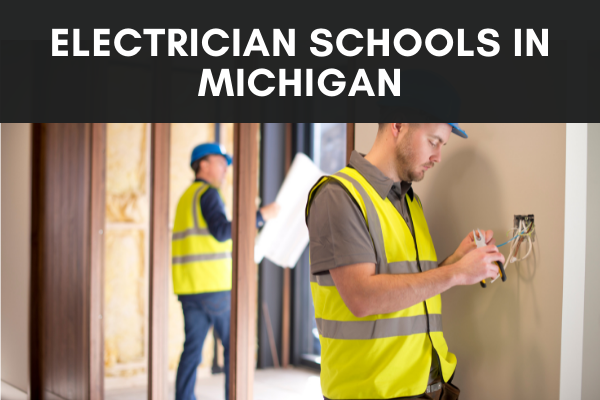If you’re looking for electrician schools in Michigan, the following list of trade schools and courses will help you get the skills you need to further your career in the electrician field.
Ann Arbor Electrical JATC
Offers an electrician apprenticeship program. This is a three-year building trades program. You will be trained to work as a construction electrician in residential locations. Apprentices work under the direct supervision of a qualified Residential Wireman doing electrical construction, renovation, and maintenance on single-family and duplex residences, townhouses, and apartment buildings.
If residential work is your interest, then apply for the Residential Apprentice program. Upon successful completion of this program and the accumulation of 8000 hours of on-the-job training, you will be classified as a “Residential Wireman.” You will receive 160 hours of related classroom training per year and you will earn 4800 hours of the 8000 hours of on-the-job training while completing the program. At the completion of the 8000 hours of on-the-job training, you will be prepared to take your licensing examination.
Commercial Program
This is a building trades apprenticeship. You will be trained to work as a construction electrician in residential, commercial, and industrial locations. You will work under the direct supervision of a qualified journeyman electrician doing electrical construction, renovation, and maintenance at manufacturing plants, office buildings, schools, hospitals, stores, apartment buildings, private homes, or any other location where electric service must be provided and maintained.
Upon successful completion of the Inside program, you will be classified as a “Journeyman Inside Wireman”. You will receive at least 8000 hours of on-the-job training and at least 800 hours of related classroom training. You will be eligible (and qualified) to take a “journeyman electrician” licensing examination in the State of Michigan. Although you will receive some training in residential construction most of your work will be on commercial and industrial job sites. If you are interested in residential construction only, do not apply for admission to this program.
Northwestern Tech
ELECTRICAL THEORY & APPLICATION
This is an introductory course that focuses primarily on the principles of electrical theory and application. Topics covered include basic electricity, electrical circuits, schematics, electrical meters, components, motors, and control devices.
Flint/Saginaw Electrical JATC
Earn while you learn! While attending the electrical apprenticeship program at the Flint/Saginaw Electrical JATC you will be given the opportunity to earn income while you attend classes.
Our electrical apprenticeship program is a 5-year program that allows the apprentice to attend class twice a month at the FSJATC and work with electrical contractors (if the apprentice is meeting the program requirements) throughout the program. This not only allows the apprentice to gain knowledge but also valuable skills on the job, all while earning an hourly rate that increases each year!
Detroit Training Institute of Technology
Students interested in starting a career as an electrician will benefit greatly from our Electrical Wiring Residential course. In this 4-month course, students will learn the basics of wiring residential according to the 2008 National Electric Code that every electrician must adhere to. The course is taught by an experienced Master Electrician. Code and safety methods are stressed in this course and all of the projects are supervised by the instructor. After the four months of class, students will graduate from this course with a certificate and the knowledge needed to pursue a career as an Electrician.
Students will receive a set of electrical hand tools complete with a pouch.
Some of the modules include
- Lighting Branches
- Fans
- Receptacles
- Repairing and installing Service panels
- Special Purpose outlets
- 2008 NEC Code
Grand Rapids Community College
The Construction Electrical Training Class will provide the basic knowledge and skill required to become an electrician and be placed in an Electrical Apprenticeship program.
Students will be required to participate in the job site, lab area, field trip, and classroom settings. Students will receive hands-on learning and application in all areas of electrical installation including employability skills, construction, electrical safety, hand and power tool safety, electrical math, electrical History, electrical theory, the National Electrical Code, electrical material identification, blueprint reading, underground installations, and residential/commercial wiring.
Upon completion of the class, graduates will receive a Certificate of Completion from GRCC and the NCCER (National Center for Construction Education ). Once Hired and registered as an Apprentice Electrician, students may request to have their Certificate articulated into credit that applies to their state-required four years of training.
IBEW 692
Those interested in the electrical field can receive training through the National Joint Apprenticeship and Training Committee of the National Electrical Contractors Association (NECA) and the International Brotherhood of Electrical Workers (IBEW).
It’s a model education partnership that produces the best trained, most up-to-date electrical apprentices and journeymen in the country. All of the $100 million that is spent annually is privately funded.
Southeast Michigan Construction Academy
Electricians read blueprints to install electrical systems in factories, office buildings, homes, and other structures.
They may also install coaxial cable for television or fiber optic cable for computers and telecommunications equipment. Electricians who work as commercial electricians may install or repair motors, transformers, generators or electronic controllers on machine tools and industrial robots. After formal apprenticeship training, electricians must pass a written test to obtain an electrician’s license.
Kellogg Community College
The Industrial Electricity and Electronics program at Kellogg Community College prepares students to install, maintain and repair such systems utilizing our top-notch equipment and self-paced instructional method.
KCC offers a certificate and an associate degree in Industrial Electricity and Electronics, as well as the more generalized Trades certificate and associate degree geared towards company-sponsored students.
- Industrial Electricity and Electronics Certificate (30 credits)
- Associate in Applied Science: Industrial Electricity and Electronics (60 credits)
- Industrial Trades Certificate (25 credits)
- Associate in Applied Science: Skilled Trades (60 credits)
A. Phillip Randolph Career and Technical Center
Energy Trades Program
In the Energy Trades Program, students will learn how to install, operate, maintain, and repair the distribution and transmission of electric lines and underground cables. Students will be introduced to alternative energy sources.
Program completers will receive safety training, exposure to skilled trades careers, potential work-based learning opportunities, and a nationally recognized certification in Energy Industry Fundamentals (EIF).
Dorsey College
With the training provided at Dorsey College, students can be prepared to seek a variety of electrical technician jobs. These can include industrial, residential, construction, commercial, municipal, or utility settings. Furthermore, qualified technicians install, repair, replace, and maintain a variety of electrical wiring, fixtures and system equipment. No prior experience in this field is required to enroll in the Electrical Technician training program, just the desire to learn.
- Install lighting systems
- Identify electrical issues using testing devices
- Direct workers to install, maintain, and repair electrical wiring and equipment
- Read blueprints and technical diagrams
- Inspect and repair electrical systems components (such as transformers and circuit breakers)
- Follow state and local building regulations
Hands-On Electrical Technician training includes:
- A hands-on approach to instruction and learning in the classroom.
- Exposure to topics such as electrical grounding/circuitry, electrical theory and safety, and branch circuit distribution.
- An opportunity to master skills needed to seek employment in industrial, residential, construction, commercial, municipal, or utility settings to install, repair, replace, or maintain a variety of electrical wiring, fixtures, and system equipment.

